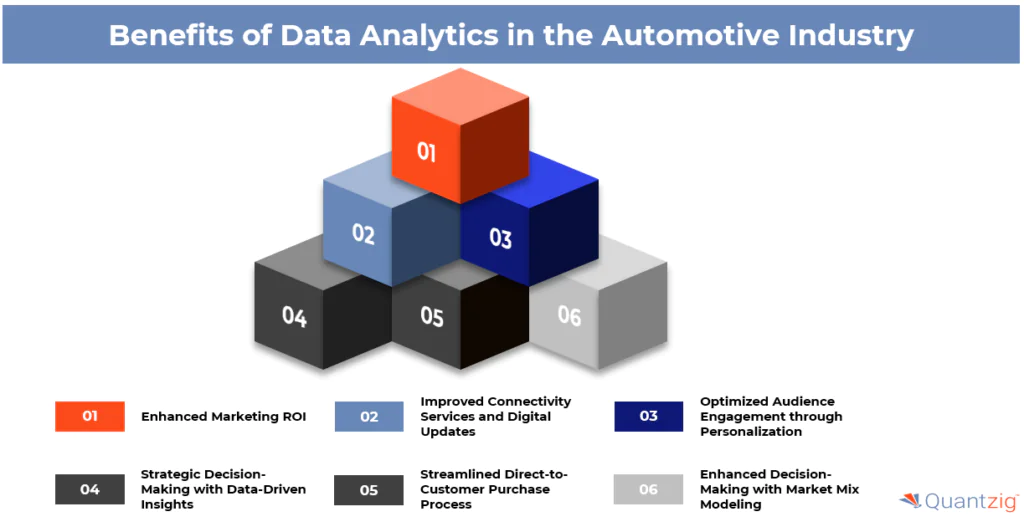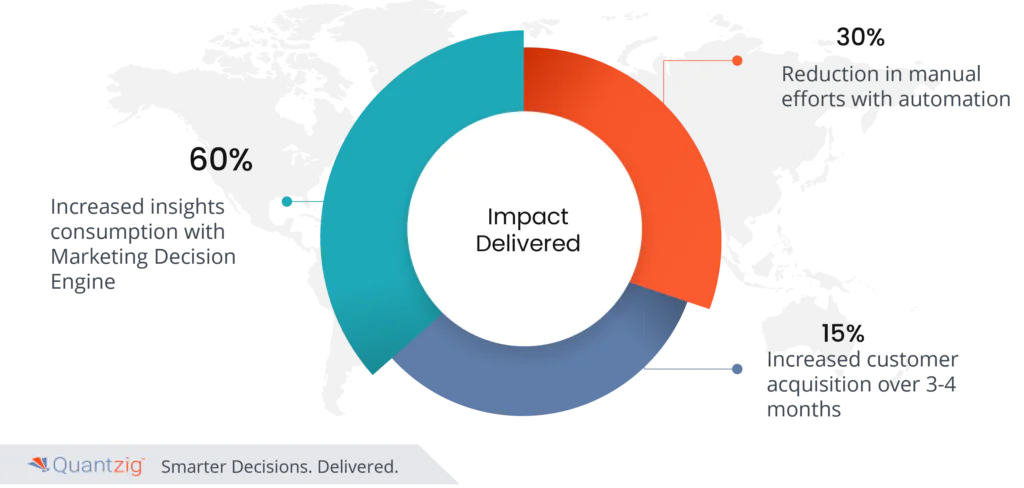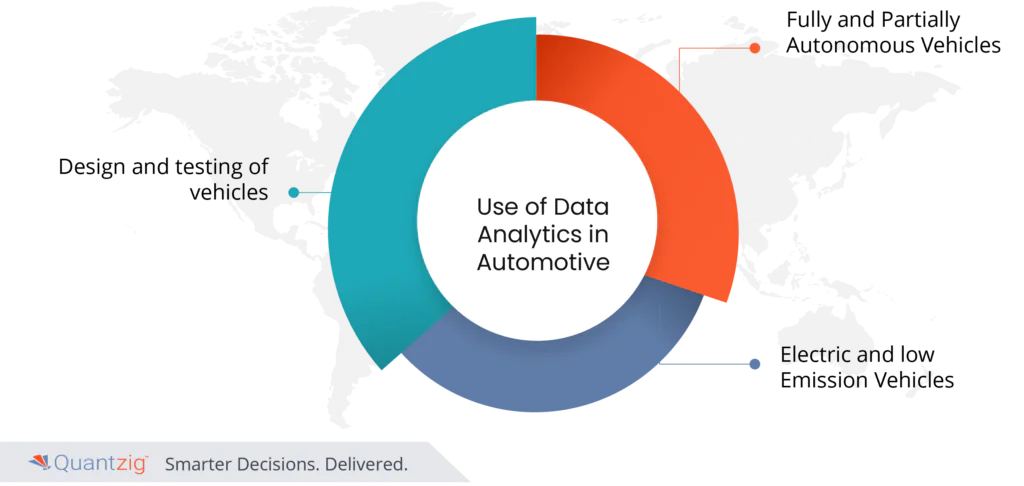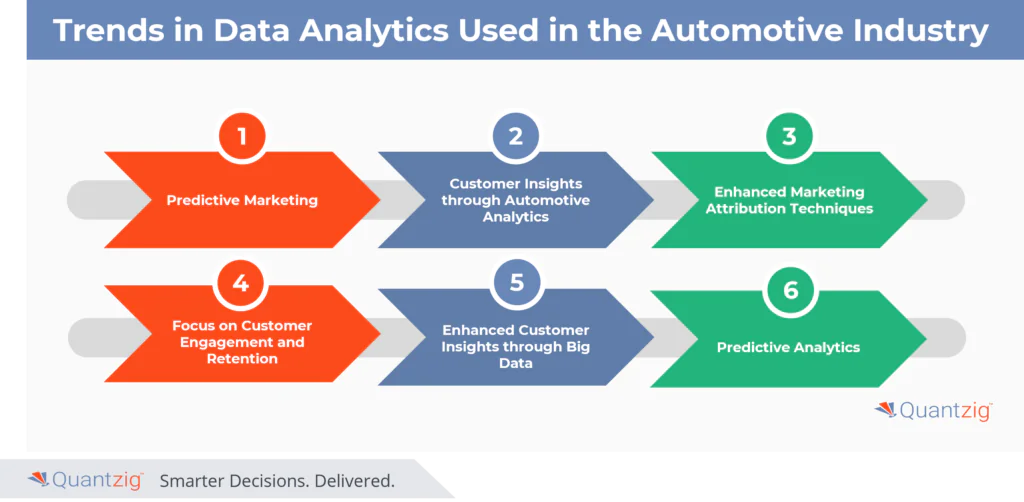Written By: Sudeshna Ghosh
Table of Contents
Key Takeaways for Automotive Marketing Analytics
- The client, a leading Automotive Giant based in the United States, experienced 60% increased insights consumption with Quantzig’s Marketing Decision Engine, 30% reduction in manual efforts with automation, and 15% increased customer acquisition over 3-4 months.
- Marketing analytics empowers automotive companies to leverage customer insights for targeted campaigns, optimize marketing strategies, personalize experiences, and drive competitive edge, ultimately ensuring sustained success and future growth in the dynamic automotive market.
- The automotive industry is witnessing a shift towards data-driven decision-making and AI-powered analytics, driving trends in automotive marketing analytics towards personalized customer experiences, predictive modeling, and advanced data visualization techniques for strategic insights and competitive advantage.
- Quantzig’s automotive marketing analytics strategies leverage advanced data analytics techniques to provide actionable insights, enabling automotive companies to optimize marketing campaigns, enhance customer experiences, and drive sustainable growth in the competitive automotive industry.
The revolutionary impact of artificial intelligence on the automotive Industry
The capital-intensive automotive industry is leading to a change in the market landscape due to globalization, shifting market conditions, cost pressures, volatility, and increased competition. With the revolutionary impact of artificial intelligence on the automotive industry, heightened customer expectations, changing ownership and usage models, this industry is on the brink of a revolution. Therefore, building an effective analytics platform is a requirement for automakers if they want a leaner, data-driven, and more profitable business environment to produce actionable business insights.
If done properly, using analytics to significantly improve customer experience, starting with customer segmentation, generative automotive industry data integration can lead to more effective customer engagement and marketing campaigns. This comprehensive study will shed light on With Quantzig as a strategic partner, automobile companies can glean data-driven insights from vast datasets, that contain current market trends, customer information, and competitive intelligence.
Book a demo to experience the meaningful insights we derive from data through our analytical tools and platform capabilities. Schedule a demo today!
Request a Free DemoData Analytics in the Automotive Industry: generative AI use cases in automotive industry by Quantzig
| Client Details | Client is an Automotive Giant based out of United States. |
| Challenges Faced by The Client | The client, a leading Automotive Giant based in the United States, encountered issues with their existing market intelligence platform, lacking focused insights for actionable changes in marketing and sales strategies. |
| Solutions Offered by Quantzig | Quantzig developed a comprehensive Marketing Decision Engine by identifying gaps in the client’s existing methodology and understanding their pain points through stakeholder discussions. Leveraging AI and advanced data processing techniques, we designed a new marketing analytics platform focused on selecting optimal data sources, ensuring data consistency, and delivering actionable insights aligned with the client’s key KPIs. |
| Impact Delivered | 1. The Marketing Decision Engine increased insights consumption by 60%, promoting better decision-making. 2. Automation reduced manual efforts by 30%, leading to cost savings. 3. Over 3-4 months, customer acquisition increased by 15% for the US market, improving overall service quality. |
Client Details
Client is an Automotive Giant based out of United States.
Challenges Faced by the Client
The Automotive Giant, a prominent player in the US automotive sector, encountered challenges with their existing market intelligence platform. Despite its presence, the platform failed to deliver targeted insights crucial for informing adjustments to their ongoing sales strategies. Insights gleaned from social and other external channels proved inadequate, resulting in decreased engagement with the data and impeding significant modifications to their promotional campaigns.
Solutions Offered by Quantzig:
We began by identifying gaps in the existing methodology for extracting insights, engaging with key stakeholders to understand their pain points and challenges regarding the quality and consumption of current marketing analytics and insights. Based on our analysis, we developed a new marketing analytics platform with a focus on selecting appropriate websites and social platforms to extract secondary data while minimizing noise.
Additionally, we implemented an AI-driven Data Enrichment engine to extract data from identified sources using APIs, Web Crawling, and Scraping, followed by Data Structuring for the generative automotive industry. Addressing the challenge of maintaining data consistency, we designed an Automated Quality framework to detect inconsistencies, set rules for auto-correction, handle missing values, and clean stop words and other prevalent data issues at the source. Analyzing the data was the subsequent step, and the availability of high-quality data significantly enhanced the quality of insights generated. To align the insights with business objectives, we identified key KPIs and built an AI-driven Insights engine to provide multiple insights across these KPIs. Moreover, we integrated a Gen-AI based prompt to deliver dynamic insights based on processed data.
Impact delivered by Quantzig using generative AI in automotive market:
By partnering with Quantzig, the client experienced a significant transformation in their data analytics capabilities and business performance. The impact of ai in automotive industry was evident in the automotive analytics solutions led to:
Our Marketing Decision Engine successfully boosted stakeholder engagement with insights by 60%. By prioritizing insights quality and enhancing dashboard usability, we facilitated more data-driven actions and increased consumption of insights. The implementation of a Quality automation layer also reduced manual workload by 30%, resulting in significant direct cost savings. Over a span of 3-4 months, leveraging the decision engine led to a 15% uptick in customer acquisition within the US market, alongside enhancements in overall service quality.
Amidst the evolution of the automotive landscape, a transition towards data-driven and audience-centric marketing strategies is imperative for sustained growth and adaptability. By collaborating with Quantzig, OEMs can harness the power of Marketing Mix Modeling and Agile Attribution capabilities, along with automotive consulting expertise, to achieve heightened transparency and foresight. This partnership empowers OEMs to navigate shifting landscapes and seize emerging revenue opportunities while optimizing both short-term and long-term business ROI. Quantzig’s tailored platforms and experienced consultants are uniquely positioned to address the distinct challenges and needs of the automotive sector, ensuring proactive alignment with evolving business trends and fostering a competitive edge for OEMs in today’s dynamic market environment.
Also Read: Campaign Effectiveness Optimization: Best Business Practices
Get started with your complimentary trial today and delve into our platform without any obligations. Explore our wide range of customized, consumption driven analytical solutions services built across the analytical maturity levels.
Start your Free Trial TodayAutomotive Marketing Analytics: An Overview of the automotive landscape
In the multifaceted domain of automotive marketing, an in-depth understanding of consumer behavior, market dynamics, and emerging technologies is indispensable. From harnessing sophisticated analytics to drive targeted campaigns and optimize marketing return on investment, to embracing innovative direct-to-consumer (DTC) models and personalized marketing strategies, automotive marketing analytics are prioritizing data-driven methodologies. By centering their efforts around audience-centricity and seamless integration of digital channels such as social media, search engines, and targeted email marketing, automotive marketers are steadfastly committed to enhancing brand visibility, fostering meaningful customer engagement, and capitalizing on nascent revenue opportunities. In this demanding sector, maintaining a competitive edge mandates unwavering agility, sustained innovation, and strategic alignment with the evolving contours of market exigencies.
Experience the advantages firsthand by testing a customized complimentary pilot designed to address your specific requirements. Pilot studies are non-committal in nature.
Request a Free Pilot6 Automotive Generative AI Marketing Strategies
With the advent of technologies like Artificial Intelligence (AI), predictive analytics, data Mining, data modeling, machine learning, and big data analytics, automotive companies are poised to unlock unprecedented insights into consumer behavior, optimize automotive digital ad spend, improve pricing strategies, and drive profitability. Moreover, the convergence of various factors, including the shift towards Electric Vehicles (EVs) and the emergence of new revenue streams, underscores the need for innovative approaches like automotive generative ai in automotive marketing analytics and strategic decision-making.

1. Understanding consumer behavior:
In comprehending consumer behavior, Original Equipment Manufacturers (OEMs) integrate a multitude of first- and third-party data sources to glean profound insights into the factors influencing consumer decisions. This amalgamation of data allows OEMs to refine their market segmentation strategies, delving beyond traditional new vehicle propensity models to encompass service and subscription models as well. By doing so, OEMs can tailor their efforts with precision, allocating resources judiciously to maximize both effectiveness and efficiency while bolstering Marketing ROI. This strategic approach using generative ai automotive industry ensures that OEMs remain agile in responding to evolving consumer preferences, ultimately fostering sustained growth and competitive advantage in the market.
2. Optimize pricing strategies:
Optimizing pricing strategies in the automotive industry is evolving beyond immediate transactions, with a growing emphasis on Customer Lifetime Value (CLV) considerations. Looking ahead, OEMs are recognizing the significance of maximizing CLV by embracing shared revenue models with dealership networks and exploring subscription-based offerings. By doing so, OEMs can enhance profit margins, enabling them to channel additional investments into strategic growth areas through data-driven portfolio optimization.
3. Customized marketing campaigns:
Personalized marketing campaigns are pivotal for automotive marketers seeking to engage their target audiences effectively. With data from sophisticated automotive marketing analytics using generative ai automotive industry, there’s a shift towards advanced audience planning, precise targeting, and continuous optimization facilitated by closed-loop processes and robust Marketing Mix Modeling capabilities. To truly stand out, automotive marketers must transcend generic “1:1 marketing” approaches and adopt innovative statistical clustering methodologies that can seamlessly integrate into ongoing media planning and buying operations.
4. Artificial Intelligence:
Artificial Intelligence (AI) is poised to revolutionize the automotive industry through the integration of cloud computing, big data analytics, data modeling, predictive analytics, and sophisticated software solutions. This convergence allows for the instantaneous synchronization of data streams from vehicles, enabling the development of unique insights and predictive models. These AI-driven insights not only reduce costs but also optimize revenue streams, ushering in a new era of efficiency. Effective coordination of these efforts with distribution and product development is essential for aligning costs with incremental revenue.
5. The shift to Electric Vehicles (EVs):
While the shift to Electric Vehicles (EVs) was anticipated to be swift, various factors have contributed to its potential short-circuiting. These include government regulations, climate considerations, the emergence of Chinese EV manufacturers, and the significant valuation multiplier of Tesla’s stock. Amidst these influences, the consumer voice often took a backseat, with supply disruptions obscuring true industry demand for nearly three years. Looking ahead, the development of marketing mix models capable of accurately capturing genuine demand and corresponding price points will prove invaluable, potentially yielding billions in cost savings and incremental investments.
6. The proficiency to backwards-engineer outcomes:
The proficiency to reverse-engineer outcomes is paramount for Marketing Analytics Teams, necessitating collaborative efforts with other OEM functions. Together, they must devise advanced models that encompass the holistic profitability trajectory. For instance, while a lower transaction price during sale might seem less lucrative initially, it could yield greater profitability over the long term, particularly considering the average ownership span of 12+ years. This underscores the increasing significance of Dealerships, potentially prompting a reassessment of Direct-to-Consumer (DTC) strategies. Efficient collaboration and strategic foresight are imperative in navigating these evolving dynamics within the automotive industry.
As automotive companies navigate the complexities of an ever-changing market, the role of marketing analytics becomes increasingly pivotal. By using the power of generative ai automotive industry and advanced analytics tools while collaborating across various functions, automotive companies can not only optimize pricing strategies but also develop predictive models that drive long-term profitability. Furthermore, by embracing emerging trends such as EVs and prioritizing customer-centric strategies, automotive companies can position themselves for sustained growth and stay ahead from the competition in the dynamic automotive landscape.
Also Read: Track Business Progress with Marketing Analytics Dashboard
Data Analytics Used in the Automotive Industry
Data analytics serves as the cornerstone of transformation within the automotive industry, harnessing the power of cutting-edge technologies such as artificial intelligence (AI), data Mining, and machine learning (ML). By leveraging vast datasets encompassing customer behavior, driving patterns, equipment performance, and more, this tool drives innovation across all facets of the automotive business. It enables designers and engineers to optimize vehicle performance, enhance quality and safety standards, and streamline efficiency. Through this tool, automotive companies can identify opportunities to produce higher-quality vehicles at reduced costs, bolster vehicle safety features, and make advanced technologies more accessible and economical. Ultimately, data analytics paves the way for continuous improvement and advancement within the automotive sector.
1. Design and testing of vehicles:
In the vehicle design and testing, AI-powered computer modeling stands as a transformative tool, offering in-depth analysis across every facet of a vehicle’s design and performance. Designers and engineers leverage this technology to detect potential issues at an early stage of development, enabling proactive adjustments. Furthermore, AI facilitates realistic scenario testing prior to physical construction, resulting in resource savings, enhanced safety protocols, and expedited design and testing timelines. By integrating more robust safety measures throughout the process, the final product emerges with heightened levels of safety and reliability.
2. Fully and Partially Autonomous Vehicles:
In the automotive innovation, data analytics is unlocking new possibilities for the development of connected and autonomous vehicles. Currently, partially autonomous features like lane assist and self-parking exemplify the integration of data-driven technologies in vehicles such as Subaru’s EyeSight and Tesla’s Autopilot. Car manufacturers are actively researching and advancing autonomous capabilities to enhance safety and elevate the driving experience. By harnessing the power of data analytics, these advancements are paving the way for a future where vehicles can navigate roads with increasing levels of autonomy, revolutionizing the automotive landscape.
3. Electric and low Emission Vehicles:
Amidst a global drive towards sustainability, data analytics emerges as a driving force behind the innovation of low emission and electric vehicles. With the aid of big data, data modeling, and predictive analytics, engineers can expedite the development of next-generation electric vehicles. Machine learning models, and data Mining play a crucial role in predicting battery behavior under varying conditions, surpassing the limitations of traditional testing methods. Through data-driven insights, automotive manufacturers can accelerate the transition towards environmentally friendly vehicles and optimize automotive digital ad spend, meeting the demands of a rapidly evolving market while minimizing environmental impact.
The automotive industry relies heavily on data analytics to navigate the complex landscape shaped by factors such as global database, varying customer buying behaviors, and intense competition. By analyzing customer journeys and understanding customer behaviors, dealerships can tailor their offerings and marketing strategies to cater to the diverse needs of auto shoppers. Moreover, insights into car models and product mixes allow businesses to optimize their inventories and enhance the overall customer experience. In the realm of digital marketing, tracking US digital ad spend and paid spend enables companies to allocate resources effectively and reach their target audience. Ultimately, leveraging data analytics empowers automotive businesses to stay ahead of the curve and drive success in an ever-evolving market.
Benefits of Data Analytics in the Automotive Industry
In today’s automotive landscape, staying ahead requires a deep understanding of market trends and consumer behavior. This necessitates leveraging cutting-edge tools like marketing analytics and embracing emerging concepts such as Connectivity Services/ Digital Updates and DTC (Direct to Consumer/ e-commerce) purchase process models. With a focus on digital updates and personalized marketing campaigns, automotive companies are poised to optimize market segmentation strategies and drive growth in an increasingly competitive market.

1. Enhanced Marketing ROI:
By leveraging automotive marketing analytics in the automotive industry, companies can gain invaluable insights into consumer behavior, enabling more targeted market segmentation and personalized campaigns. This leads to improved audience targeting across various channels including digital marketing campaigns, social media advertising, Targeted Display Advertising, and targeted email marketing. As a result, automotive companies can optimize their efforts, achieving both short-term and long-term ROI. Through continuous analysis using marketing mix modeling, companies can refine strategies to maximize revenue streams and drive sustainable growth.
2. Improved Connectivity Services and Digital Updates:
Integrating Connectivity Services/ Digital Updates into automotive offerings allows for seamless digital updates, enhancing the DTC purchase process model. By utilizing data analytics, automotive companies can tailor these updates to meet consumer preferences, offering a personalized experience that fosters brand loyalty. Moreover, by embracing service and subscription models, companies can provide ongoing value to customers while generating additional revenue streams. This proactive approach to connectivity not only meets consumer demands but also ensures that vehicles remain updated with the latest features and technology.
3. Optimized Audience Engagement Through Personalization:
Data analytics empowers automotive companies to deliver highly personalized marketing campaigns tailored to individual consumer preferences. By analyzing vast datasets, companies can identify trends and patterns to inform targeted messaging and offers. This level of customization enhances audience targeting effectiveness and increases engagement across digital platforms such as social media and search engines. Through effective search engine optimization and targeted email marketing, automotive companies can amplify their reach and resonate more deeply with their target audience, driving higher conversion rates and brand affinity.
4. Strategic Decision-Making with Data-Driven Insights:
Utilizing data analytics in the automotive industry enables companies to make informed decisions based on empirical evidence rather than guesswork. By conducting thorough analysis, companies can uncover hidden opportunities for growth and innovation, leading to more effective marketing segmentation strategies and revenue optimization. This data-driven approach not only enhances short-term performance but also fosters long-term success by aligning marketing efforts with consumer preferences and market trends. Through continuous monitoring and analysis, automotive companies can stay ahead of the competition and maintain their position as industry leaders.
5. Streamlined Direct-to-Consumer Purchase Process:
Incorporating DTC (Direct to Consumer/ e-commerce) purchase process models into automotive marketing strategies streamlines the purchase process for consumers, leading to increased efficiency and convenience. By leveraging automotive marketing analytics, companies can optimize the DTC purchase process model through personalized digital experiences tailored to individual preferences. This includes targeted email marketing campaigns and digital marketing campaigns aimed at guiding consumers seamlessly through the purchasing journey. Through strategic implementation of Connectivity Services/ Digital Updates, automotive companies can enhance the online shopping experience, driving higher conversion rates and ultimately boosting revenue streams.
6. Enhanced Decision-Making with Marketing Mix Modeling:
Employing marketing mix modeling empowers automotive companies to make strategic decisions backed by data-driven insights. By analyzing the effectiveness of various marketing segmentation strategies and channels, companies can optimize their short-term and long-term Marketing ROI. This includes refining personalized marketing campaigns and allocating resources towards the most impactful audience targeting approaches. Through continuous monitoring of digital marketing campaigns performance and social media advertising effectiveness, companies can adapt their strategies in real-time, maximizing engagement and driving sustained growth in the automotive market.
As the automotive industry continues to evolve, the role of data analytics emerges as a critical driver of success. By harnessing the power of marketing mix modeling and prioritizing audience targeting through digital marketing campaigns and social media advertising, companies can navigate market dynamics with agility and precision and optimize automotive digital ad spend. Embracing the benefits of data analytics not only enhances marketing ROI but also ensures that automotive companies remain at the forefront of innovation, delivering value to customers and driving sustainable growth in the digital age.
Trends in Data Analytics Used in the Automotive Industry
The utilization of data analytics has emerged as a pivotal determinant of success. From leveraging a comprehensive global database to understanding intricate customer buying behaviors, dealerships are capitalizing on data-driven insights to navigate the evolving customer journey. Moreover, with increasing US digital ad spend and emphasis on paid spend, automotive businesses are refining their strategies to resonate with discerning auto shoppers. This paradigm shift extends to optimizing product mixes and staying abreast of competition through sophisticated data analytics methodologies. As such, this section sets the stage for exploring the transformative trends shaping the future of automotive data analytics
1. Predictive Marketing:
With the automotive industry’s increasing reliance on big data and historical data, predictive marketing emerges as a powerful trend. By leveraging advanced statistical techniques and forecasting, businesses can anticipate consumer purchase trends and tailor their marketing strategies accordingly. This proactive approach enables dealerships to identify potential conquest customers and personalize offerings to meet their needs, ultimately gaining a competitive edge in the market.
2. Customer Insights through Automotive Analytics:
Another prominent trend is the emphasis on extracting actionable data from automotive analytics to gain deeper customer insights. By analyzing the customer journey, customer buying behaviors, and customer loyalty, dealerships can develop targeted sales strategies and enhance the overall sales process. This trend involves leveraging sophisticated analytics tools and technologies within dealerships to empower sales teams with real-time data and optimize their performance in meeting consumer demands and exceeding expectations.
3. Enhanced Marketing Attribution Techniques:
With the rise of digital marketing channels such as paid search, organic search, organic social, and email marketing, automotive businesses are investing in sophisticated marketing attribution methods. Leveraging advanced marketing attribution tools, organizations can accurately track and attribute conversions across various touchpoints in the customer journey. By identifying the impact of each marketing channel on conversion rate and sales, businesses gain actionable insights into optimizing their marketing strategies and allocating resources effectively.
4. Focus on Customer Engagement and Retention:
Recognizing the significance of customer buying behaviors and the value of repeat customers, automotive companies are prioritizing efforts to enhance customer engagement and foster loyalty. Utilizing data analytics, businesses are implementing strategies such as social proofing and lead attribution to nurture relationships with existing customers. Moreover, the emergence of conversion benchmark reports allows organizations to benchmark their performance against industry standards, enabling continuous improvement in customer retention and satisfaction metrics. These trends underscore the industry’s commitment to leveraging data analytics for sustainable growth and success.
5. Enhanced Customer Insights through Big Data:
With the proliferation of digital platforms and the advent of big data analytics, automotive companies are increasingly focusing on extracting actionable insights from vast amounts of customer data. By harnessing customer insights derived from big data analytics, businesses gain a deeper understanding of customer loyalty, preferences, and behaviors throughout the customer journey. This enables them to optimize their sales strategy, improve customer retention, and develop targeted marketing strategies to address evolving consumer needs and preferences.
6. Predictive Analytics:
The automotive industry stands on the cusp of a data-driven revolution, where leveraging a comprehensive global database and harnessing insights into customer buying behaviors are paramount. As dealerships navigate the intricacies of the customer journey, the allocation of resources towards US digital ad spend and paid spend becomes increasingly strategic. By understanding the preferences of discerning auto shoppers and optimizing product mixes, businesses can effectively navigate the landscape of competition. As the industry continues to evolve, trends in data analytics will remain instrumental in driving innovation and maintaining a competitive edge in the automotive sector.
What does the Future hold for Automotive Data Analytics?
Marketing always plays a pivotal role in driving growth and innovation. Leveraging advanced marketing analytics techniques like targeted display advertising and insights from search engine optimization, automotive companies can stay abreast of emerging marketing trends and consumer preferences, ensuring strategic alignment with evolving market demands. With the proliferation of connectivity services and digital updates, automotive marketers have the opportunity to engage consumers directly through DTC (Direct to Consumer/ e-commerce) purchase process models, thereby diversifying revenue streams and enhancing marketing ROI over both short and long terms.
Through in-depth marketing mix modeling and segmentation, companies can tailor their strategies to target specific audience segments, while embracing service and subscription models enables ongoing customer engagement and revenue generation. The implementation of personalized marketing campaigns further amplifies audience engagement, supported by targeted approaches such as digital marketing campaigns, social media advertising, search engine optimization, targeted display advertising, and targeted email marketing. In essence, automotive marketing encompasses a multifaceted approach that prioritizes effective audience targeting and strategic utilization of digital channels to drive brand visibility, customer engagement, and ultimately, business success.






